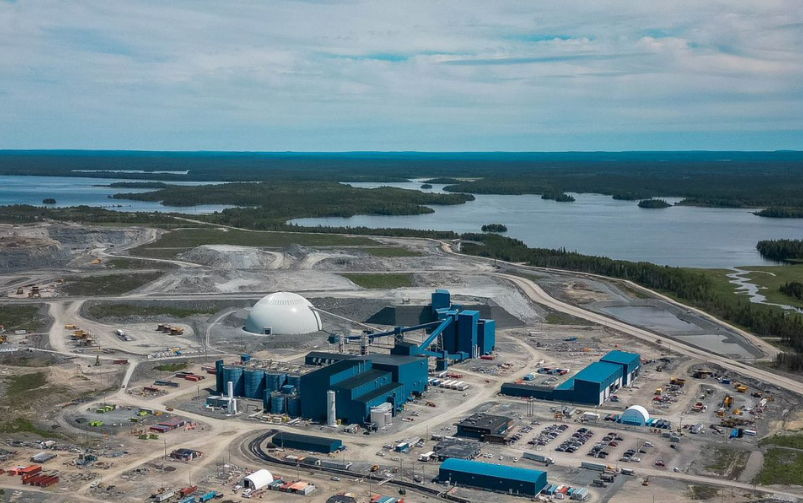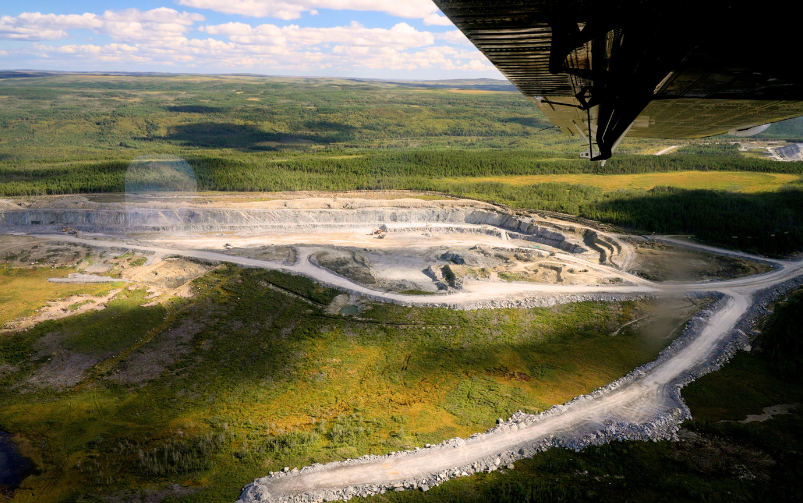Agnico Eagle’s Detour Lake open-pit mine, located northeast of Cochrane, Ontario, is the largest gold-producing mine in Canada. Courtesy of Agnico Eagle.
Welcome back to your weekly mining news recap, where we catch you up on some of the news you may have missed. This week’s headlines include the end of strike action at the Gibraltar mine, Ontario’s agreement to improve roads connecting four First Nations communities located near Ontario’s Ring of Fire region to the province’s highway system, and Kingston-based Cyclic Materials signs a new supply agreement with Belgian chemical company Solvay.
Agnico Eagle has released a preliminary economic assessment for underground mining at its Detour Lake gold mine, located near Cochrane, Ontario, as reported by Canadian Mining Journal. An investment of $137 million over the next three years will allow the company to continue to analyze and eliminate risks from the planned underground mine, while also installing an exploration ramp and collecting a bulk sample.
Capital Power’s Genesee generating station, which was Alberta’s last remaining coal-fired power station, officially repowered with natural gas on June 16—five years ahead of the provincial government’s mandate to end coal-powered electricity, as reported by Canadian Mining Journal. The company stated that through its repowering program, it will reduce up to 3.4 million tonnes of annual CO2 emissions.
Canada’s federal government and the Saskatchewan Research Council (SRC) have intervened to prevent the sale of Canadian rare earth metals to China’s Shenghe Resources, as reported by The Globe and Mail. A stockpile of rare earths from Australia-based company Vital Metals, which were mined at the Nechalacho project in the Northwest Territories, was initially going to be sold to Shenghe Resources, but will now be sold to the SRC for $3 million, a deal facilitated by Natural Resources Canada.
Following a strike at Taseko Mines’ Gibraltar mine in B.C.—which saw over 500 workers walk off the job on June 1 and forced the mine to suspend operations—the company recently came to an agreement with the union representing the workers, as reported by Mining.com. The updated agreement will be in place until May 31, 2027, and the company announced on June 19 that it has restarted operations at its Gibraltar mine.
Ontario has inked a deal with four First Nations communities for new roads, infrastructure projects and skills training to support mining in the province’s Ring of Fire region, as reported by The Canadian Press. All-season roads that connect Animbiigoo Zaagi’igan Anishinaabek, Aroland, Ginoogaming and Long Lake #58 to the provincial highway system will be improved later this year. On June 18, Ontario Premier Doug Ford visited the Greenstone municipality to finalize the agreement and to announce funding and initiatives supporting future mining development in the region, which includes $1.9 million for Indigenous skills training and $2 million for the Migizi Plaza rest stop, which the province said will “create jobs and drive revenue for the First Nations and municipality of Greenstone.”
Cyclic Materials, a Kingston-based startup focused on recycling rare earth elements, inked a deal with Solvay, a Belgian chemical company, on June 18, which will see recycled mixed rare earth oxide (rMREO) from Cyclic Material’s Hub100 facility in Kingston shipped off to Solvay’s La Rochelle facility in France later this year. Once the rMREO arrives at Solvay’s operation, it will be used for electric vehicle, wind power and electronic applications.
McEwen Mining has raised $30 million to invest in the exploration and development of the next mine project set to be built at the company’s Fox Complex, located east of Timmins, Ontario, as reported by Northern Ontario Business. McEwen secured financing last week via a flow-through share offering, which will be allocated to exploration drilling and the construction of an underground access ramp from the surface to its Stock East and West properties to access gold deposits.
A new report commissioned by the Alberta government and conducted by Deloitte suggests that Canada’s oil and gas companies, which are facing a federally imposed emissions cap, will opt to cut production instead of investing in pricey carbon capture and storage technology, as reported by The Canadian Press. The report opposes the federal government’s belief that its proposed cap on greenhouse gas emissions would reduce pollution without needing to limit production.
The 2024 edition of the Northern Mine Rescue Competition, organized by the Northern Mining Health and Safety Forums, took place from June 14 to 15 in Yellowknife, as reported by Cabin Radio. Out of the seven participating teams from across the N.W.T. and Nunavut, as well as one visiting team from Rio Tinto in the U.S., Agnico Eagle’s Meliadine Gold Mine team were the overall winners for the underground rescue events and De Beers/Mountain Province Diamonds’ Gahcho Kué mine came out on top for the surface rescue events.
Cameco’s Elders’ Advisory and Knowledge Keeper Program employs Indigenous elders at its operations in northern Saskatchewan to offer culturally sensitive support, as reported by Tijana Mitrovic for the May issue of CIM Magazine. This new initiative aims to improve employees’ mental health and well-being by offering confidential guidance in traditional languages, while also promoting cultural connections for the company’s Indigenous workforce, which comprises half of Cameco’s employees in the region.
That’s all for this week. If you’ve got feedback, you can always reach us at editor@cim.org. If you’ve got something to add, why not join the conversation on our Facebook, Twitter, LinkedIn or Instagram pages?




